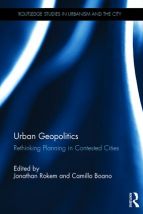Urban Geopolitics: Rethinking Planning in Contested Cities

Urban Geopolitics aims to bring geopolitics into the mainstream of urban studies to enhance an understanding of cities as contested nexus points of social, spatial and political change. Underlying the volume’s various contributions is the argument that different kinds of contested cities are increasingly similar due to ethnic, racial and class conflicts revolving around issues of housing, infrastructure, participation and identity, among others. The book adopts a postcolonial comparative and relational perspective, and calls into question the longstanding Eurocentric approach in urban studies that focuses on methodological regionalism and assumes incommensurability. To this end, the chapters of the book present case studies from Latin America, East Asia, the Middle East, Africa and Europe. The book argues that contested urbanism may have more in common in different world regions than previously perceived in urban studies and planning literature.
The volume contains five parts, made up of 13 chapters. The first part adopts a comparative approach between two cities differentiated in terms of their urban geopolitical process and regional settings (Sarajevo and Beirut; Nairobi and Cape Town; and Stockholm and Jerusalem). The second, third and fourth parts focus on regions: South and South East Asia, the Middle East and North Africa, and Latin America, respectively. Each of these chapters is unique, with its own manifestations of how planning is framed within localised urban geopolitics.
The volume concludes with a discussion on urban geopolitics between the book’s editors and University College London economist/geographer Michael Safier. Safier shares his personal interest in cosmopolitan urbanism as an overarching approach to understanding changing global forces, and as the prerequisite to reframing what has been labelled as “postcolonial” with regard to urban geopolitics and planning in various contested cities. Safier argues that further enquiry into urban geopolitics is increasingly urgent and crucial, and that the comparative approach is greatly needed.
Book note prepared by Kate Goh
Search the Book notes database
Our Book notes database contains details and summaries of all the publications included in Book notes since 1993 - with details on how to obtain/download.
Use the search form above, or visit the Book notes landing page for more options and latest content.
For a searchable database for papers in Environment and Urbanization, go to http://eau.sagepub.com/

